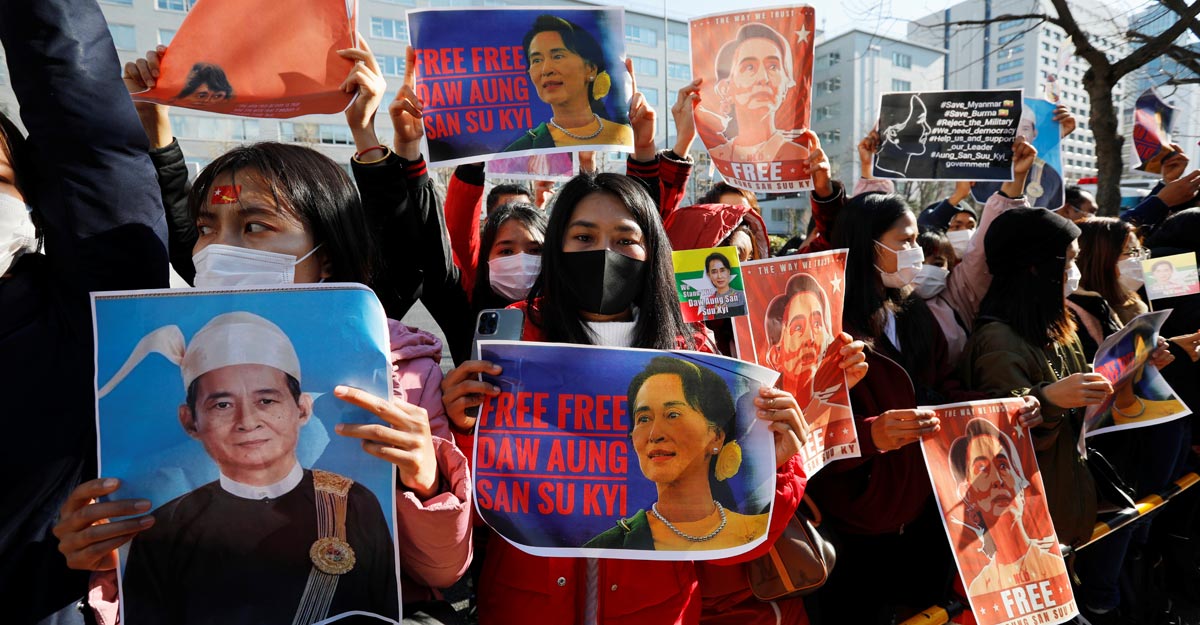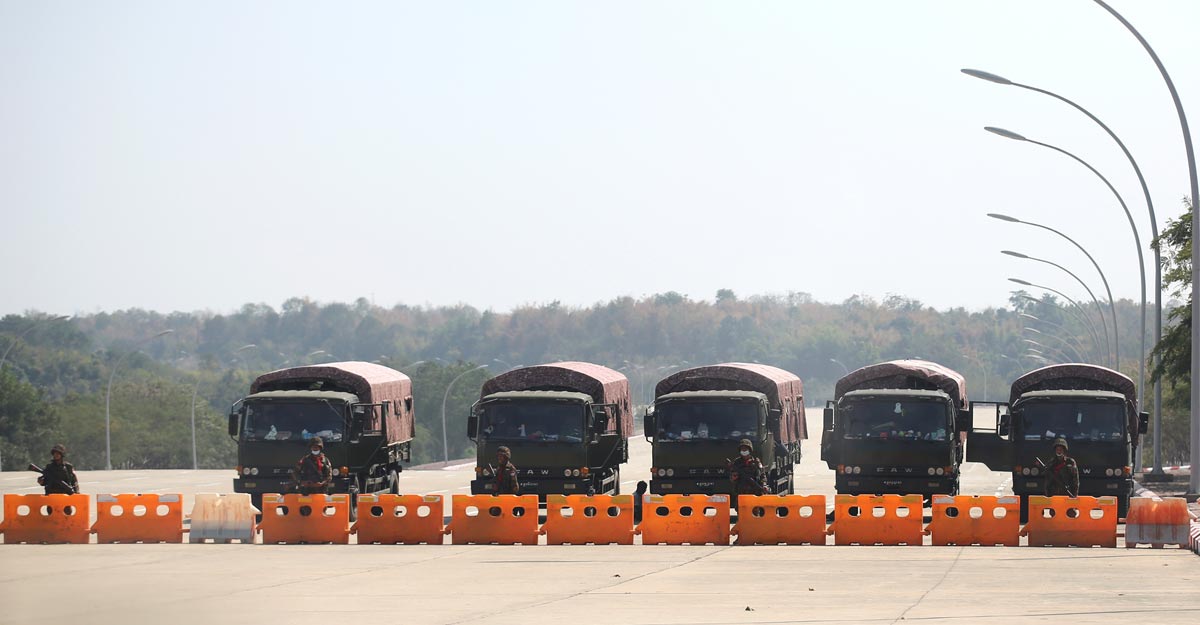Column | No Tears for Aung San Suu Kyi

Mail This Article
The military coup in Myanmar is nothing more than a “self-goal” by the army. In reality, Myanmar did not have democracy since Ne Win upstaged Prime Minister U Nu and unleashed one of the most ruthless and ego-driven military dictatorships. He followed a policy, which anticipated the future advent of Donald Trump in the United States. He declared that Myanmar, then known as Burma, would follow its own policy of Socialism with no links either with the Super Powers or neighbours. His isolationist policy made Myanmar poor after a million well-to-do Indians, the backbone of the economy, were expelled with nothing but the clothes they wore. No compensation was paid to any of them. Indian farmers were allowed to stay on and now they eke out an existence in a couple of villages as “foreigners.”
Government officials kept a distance from diplomats, who had to play golf to cultivate the military oligarchy which occupied all the civilian posts including those in the Foreign Office. They would not meet diplomats in their offices as that would involve work in reporting on the conversations. Ne Win often claimed that he was a close friend of India's Gandhi family, but the only time he demonstrated his affection was when he went to Delhi a week after the assassination of Indira Gandhi to express condolences to Prime Minister Rajiv Gandhi. In an emotional meeting during which he claimed to be an affectionate “uncle”, Ne Win said he wanted to improve relations with India and asked for a grand plan to increase trade and cultural relations. When I returned to Myanmar and announced the new plans, there was no response from the Government and even a meeting was not possible in the Foreign Office. On some informal advice that we received that Myanmar will be happy if we purchased some rice, we did so and that was the only commercial deal that took place.
The experience was the same with other countries except Japan and South Korea which lavished gifts on Myanmar. The only time Ne Win met the Ambassadors was when he held a golf tournament for heads of mission together with the senior military officers. He did crazy things like abolishing English in the country and ordering cars to drive on the left without any alterations in the cars or the roads, causing the highest number of accidents in one single day. He personally went to a night club and beat up the musicians and destroyed their musical instruments!
North Korean terrorists bombed a mausoleum in Yangon, where the South Korean President was to reach in the next few minutes, killing several members of his entourage including the South Korean Foreign Minister and Ambassador to Myanmar. North Korea chose Myanmar because anyone in a military uniform could do anything there. But the culprits were caught and executed with military precision.
Her struggles
Aung San Suu Kyi, daughter of a former Prime Minister of Burma, was partly educated in India and lived in London with her British husband. She showed no interest in the plight of her people under a military dictatorship. In 1988 she came to Yangon alone to nurse her dying mother, but in response to the brutal killing of protesters against the military government, she spoke out against Ne Win and began a non-violent struggle for democracy and human rights and eventually became the leader of the Burmese opposition forces. Unaccustomed even to whispers against him, Ne Win placed her under house arrest in Yangon incommunicado. She rejected an offer to be released if she returned to the UK.

The National League of Democracy (NLD) she co-founded in 1988 won more than 80% of the parliamentary seats in 1990, but the results were nullified by the army and she remained in detention for long. After she won the Nobel Prize, some restrictions on her were lifted, but she did not travel to receive the Nobel for fear that she would not be allowed to return. She did not even go to London to attend her husband’s funeral in 1998. She continued in various forms of detention and she grew in stature nationally and internationally as the potential saviour of the Myanmar nation, which was under military rule since 1962. After she won a Parliamentary seat under a new constitution, which prohibited her from holding high office, she was allowed to travel to Oslo, London and Beijing. Her party won again in 2015.
Opportunism to the fore
Her reincarnation as the de facto Prime Minister (State Counsellor) marked her disgraceful coalition with the army and indirectly with China. The control of the country was still in the hands of the army, but her international image gave respectability to the regime. The army recruited her because the economic sanctions of the western countries were hurting the economy.
India, which had already chosen to deal with the Government in power, felt comfortable in doing business with Myanmar. The idea was to wean Myanmar away from China, or at least to balance China. Though she focused on finding peace with the many insurgencies in Myanmar, the action taken by her Government, following some attacks by the Rohingyas in the Rakhine state invited international criticism. Thousands of Rohingyas became refugees in Bangladesh and elsewhere and many perished in the exodus. Her defence of the actions against Rohingyas in the International Court of Justice was condemned by many countries and major human rights organizations as an opportunist and enemy of democracy.
Short-lived success
Suu Kyi won the elections again in November 2020, but the army struck on February 1, 2021, the day the parliament was to meet and arrested her and other leaders of her party on charges of election fraud. She faces an unknown future, particularly since she had become a puppet of the army and lost her aura as a defender of human rights. The condemnation of the coup by the international community was mild and some countries like Thailand termed it as an internal matter of Myanmar. India expressed deep concern and said that “We believe that the rule of law and the democratic process must be upheld.” There was no call for release of Suu Kyi in spite of her special connections with India. India had sent 15 lakh doses of the Covishield vaccine to Myanmar in January this year. India also had announced a gift of a submarine to Myanmar. India will strive to continue its cooperation with the Government in accordance with India’s policy to deal with the Government in control.

A rare case
Suu Kyi is perhaps the only political leader in history to have won a Nobel Prize for Peace for her defiance of military despotism, then joined her tormentors to gain political power, made a deal with the devil and gave it a human face and defended it in the International Court of Justice, won the elections again and was ousted in another coup. We probably have not heard the last of her, but she has fallen from her high pedestal as a defender of human rights to a disgraced agent of a military regime. No wonder, there was a demand for her to be stripped of her Nobel Prize. The daughter of an assassinated iconic leader of Burma, considered the Father of the Nation, has the double infamy of giving up the struggle for democracy and legitimizing the genocide of a section of her own people. She may, at best, cobble another alliance with the army, but no one will shed tears for her even if she does not return to power.


